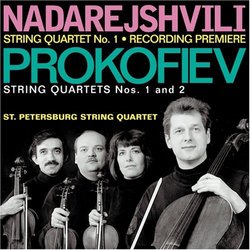| All Artists: Sergey Prokofiev, Zurab Nadarejshvili Title: Nadarejshvili, Prokofiev: String Quartets Members Wishing: 1 Total Copies: 0 Label: Delos Records Release Date: 7/27/1999 Genre: Classical Styles: Chamber Music, Symphonies Number of Discs: 1 SwapaCD Credits: 1 UPC: 013491324722 |
Search - Sergey Prokofiev, Zurab Nadarejshvili :: Nadarejshvili, Prokofiev: String Quartets
 | Sergey Prokofiev, Zurab Nadarejshvili Nadarejshvili, Prokofiev: String Quartets Genre: Classical
|
Larger Image |
CD Details |
CD ReviewsA universe of hardship Stephen D. Estep | Strongbadia | 06/12/2008 (4 out of 5 stars) "It's always been a petty annoyance to me that recordings of unfamiliar pieces require the reviewer to relate the piece to the listener instead of only the performance, but in this case, it's a pleasure. The Nadarejshvili Quartet is a gem. He makes use of Georgian chants and folk songs, illuminating the melodies instead of merely putting them on exhibition. A few places in the Prokofiev quartets bear a resemblance to the Nadarejshvili - the slow opening of the first quartet's second movement; the Kabardinian tunes in the second quartet, especially in the last minutes of its second movement; and the sul ponticello in the third movement.
I wonder a little if the Quartet recorded the Prokofiev pieces to have the chance to put the awesome Nadarejshvili in people's ears. (If they did, it's OK by me.) The playing on the Nadarejshvili is more polished, unified and detailed; I wouldn't say they treat the Prokofiev like old hat, but the Nadarejshvili is what makes this CD special thing. The Prokofiev quartets aren't exactly buttresses of the repertoire anyway (if repertoires can have cornerstones, they can certainly have buttresses), and the Georgian's quartet deserves to be heard at least as often. The Prokofiev First Quartet starts with some slightly wobbly intonation, but the players find their center within a few seconds. The transitions make sense in their hands; the Allegro is played with appropriate attention to tempo and dynamics, and the performers don't get in the way of the music. In the second movement the playing is weaker. I want more warmth and agreement, specifically at 4:10 where the upper strings accompany the cello in the temporarily-F-major section. III should be more emotional; I feel the quartet doesn't play quite as passionately (sufferingly) as the music calls for. The performance is better than acceptable, but not what it could be. And the liner notes irritatingly hint at how Prokofiev reconciled the tonic of B minor with the cello's lowest note being C. I want to know what happened. The booklet designers could have skipped the page and a half of reviews of the St. Petersburg Quartet; there's no need to sell me on a group when I've already bought their CD. Sergei's Second melds the vigor of the Kabardinian folk songs with the placing and polish the classical setting requires. I like the Quartet's playing better on this piece - the cello interjections in the first movement are grinningly played, and the whole ensemble gets the essence of the second movement, for sure. They bring the folk melodies' expansiveness and longing out of the "bleak hotel room" where the piece was written, and into your heart. The third movement's melodic echoes of the first are cunningly presented, as well as the panicked urgency usually associated more with Shostakovich than Prokofiev. Then there's the Nadarejshvili. With the slowly descending opening notes, glassy, fragile, tremulous, the piece gently but firmly pulls your soul into a look back at a universe of hardship. (You've heard these tones before; your ears have rung with them in times of hatred and oppression.) At the halfway point, a small outburst (but one held inside) takes the remembrances from the cello and gives them to the violin's higher register, to a different voice and another's rehearsal of the same time. Though there aren't strict melodies or thematic development, there are thoughts and opinions. Instead of translating emotions into tunes, Nadarejshvili has brilliantly taken squirming coils of notes and transfigured them into memories. The intensity of the second movement is contained alternately in the rhythmic attacks, insistent handfuls of notes, percussive playing, and ultimately percussion itself, as the players tap their instruments and bow almost pitch-less notes. One melody escapes skyward, only to be pulled back and dropped on the ground later. Panic, sirens, restlessness, scheming and disintegration are the themes of this movement, enviably well-played by the Quartet. The third movement opens with the same sparseness as the first, but at eye level instead of so far above your head. A halting pizzicato tune, starting a minor 7th above the drone, soon blossoms when the other instruments enter and verify what is being sung. All the strings, now arco, hover around that 7th, with sounds that remind me of Kronos Quartet's playing of Tallis's Spem in Alium. The return of the "7th" theme opens up the movement finally and literally (you won't miss this moment), presenting its final tale of suffering, and the inner piece and quietness that can come in spite of it. Again, your attention is drawn to the contentment of the open sky. There is a warmth and reverence to this movement that willingly, lovingly carries the weight of Georgian history. This is a must-have for your chamber music collection. The Prokofiev quartets are mostly satisfactory, and the Nadarejshvili is something you simply must hear." |

 Track Listings (9) - Disc #1
Track Listings (9) - Disc #1